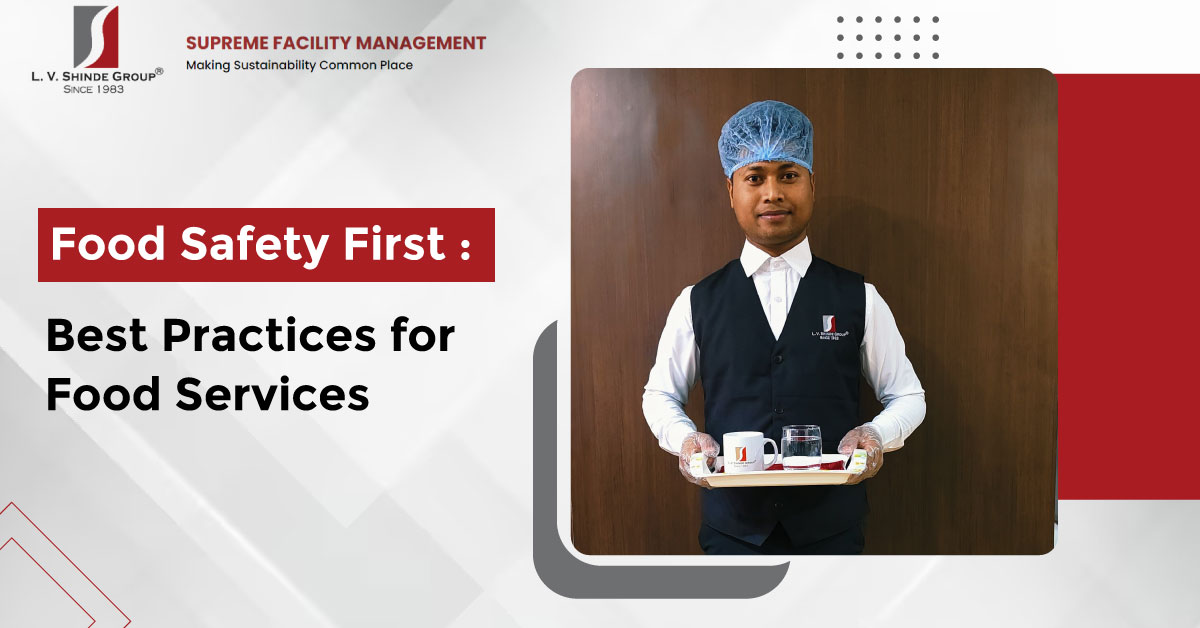Food Safety First: Best Practices for Food Services
In the bustling world of food services, where culinary delights meet hungry patrons, one factor reigns supreme: food safety. From small eateries to large catering companies, maintaining impeccable food safety practices is not just a regulatory requirement but also a moral obligation towards customers. In this comprehensive guide, we delve into the importance of food safety in the food service industry, key areas to focus on for maintaining food safety, regulations and guidelines in India and globally.
Importance of Food Safety in the Food Service Industry
Ensuring food safety in the food service industry is paramount. Good food hygiene isn’t just about tastier meals; it’s about keeping customers safe. By preventing harmful microorganisms from contaminating food, avoiding cross-contamination, and meeting legal requirements, businesses not only safeguard public health but also protect their valuable reputation. Food safety is paramount in the food service industry for several reasons:
1. Customer Health:
The primary concern of food safety is to prevent foodborne illnesses and ensure the well-being of consumers. Contaminated food can lead to a range of illnesses, from mild stomach upsets to severe infections.
2. Reputation:
A single instance of food poisoning can tarnish the reputation of a food service establishment irreparably. Word-of-mouth travels fast, and a reputation for unsafe food practices can drive customers away.
3. Legal Compliance:
Governments worldwide have stringent regulations regarding food safety. Non-compliance can result in fines, closures, or even legal action, which can significantly impact a business’s bottom line.
4. Business Sustainability:
Maintaining high food safety standards is not just about avoiding risks; it’s also about building trust with customers. A devoted customer following is essential for sustaining long-term business prosperity.
5. Ethical Responsibility:
Food service providers have a moral obligation to deliver safe and hygienic food to their customers. This responsibility extends from sourcing ingredients to storing, preparing, and serving food.
Key Regulations and Guidelines for Food Services in India and Worldwide
India:
In India, the food service industry operates under the purview of the Food Safety and Standards Authority of India (FSSAI), which lays down regulations to ensure the safety and quality of food products. Here are some key regulations that directly impact food service establishments:
1. Food Safety and Standards Act (FSSA), 2006:
This act forms the backbone of food safety regulations in India. It mandates that all food business operators (FBOs), including restaurants, hotels, caterers, and food processors, comply with food safety standards and obtain necessary licenses and registrations from the FSSAI.
2. Food Safety and Standards (Licensing and Registration of Food Businesses) Regulations, 2011:
These regulations outline the licensing and registration requirements for different categories of food businesses based on their size, turnover, and nature of operations. For instance, small-scale eateries may require a basic registration, while larger establishments need a full-fledged license.
3. Food Safety and Standards (Food Products Standards and Food Additives) Regulations, 2011:
These regulations set the standards for various food products, including permissible limits of contaminants, food additives, and labeling requirements. For food service providers, adherence to these standards is crucial in ensuring the safety and integrity of the dishes they serve.
4. Hygiene and Sanitation Guidelines:
The FSSAI provides detailed guidelines on hygiene and sanitation practices for food service establishments. This includes requirements for kitchen cleanliness, waste disposal, pest control, and personal hygiene of food handlers.
5. Allergen Management:
With an increasing awareness of food allergies among consumers, the FSSAI mandates that food service providers clearly label allergens present in their dishes. This helps customers make informed choices and prevents accidental exposure to allergenic ingredients.
6. Hazard Analysis and Critical Control Points (HACCP):
While not mandatory for all food businesses, implementing a HACCP-based food safety management system is highly recommended, especially for large-scale food service operations. HACCP helps identify and control hazards at critical points in the food production process, reducing the risk of foodborne illnesses.
Worldwide:
In addition to national regulations, the global food service industry is guided by several international standards and organizations:
1. Codex Alimentarius Commission:
This international body, jointly established by the Food and Agriculture Organization (FAO) and the World Health Organization (WHO), develops harmonized food standards, guidelines, and codes of practice. While Codex standards are not legally binding, they serve as a reference for countries and food businesses worldwide.
2. Global Food Safety Initiative (GFSI):
GFSI benchmarks various food safety standards and provides guidance on best practices for food safety management systems. Many food service establishments align their operations with GFSI-recognized standards such as FSSC 22000, SQF, and BRCGS to demonstrate their commitment to food safety.
3. ISO 22000:
This international standard specifies requirements for a food safety management system that encompasses all stages of the food supply chain, including food service. ISO 22000 certification is widely recognized and demonstrates a company’s ability to control food safety hazards effectively.
4. Good Manufacturing Practices (GMP):
While primarily associated with food manufacturing, GMP principles apply to food service settings where food handling, storage, and preparation are critical. Adhering to GMP guidelines helps maintain hygiene, traceability, and quality in food operations.
5. International Food Safety Authorities Network (INFOSAN):
INFOSAN facilitates rapid communication and collaboration between food safety authorities globally. In an interconnected food supply chain, timely information sharing is vital to managing food safety incidents and recalls.
15 Best Practices for Food Services in the Indian Food Industry
The Indian food industry is vast and diverse, encompassing everything from street vendors to fine dining restaurants. Here are 15 best practices tailored to this unique market, incorporating essential food safety measures and current Indian industry trends:
1. HACCP-based Food Safety Management System:
Implement a HACCP system following the guidelines set by the Food Safety and Standards Authority of India (FSSAI). This ensures adherence to local regulations and prioritizes food safety throughout the entire food chain.
2. Staff Training on Local Regulations:
Train staff on FSSAI regulations specific to India, including licensing requirements, hygiene practices, and waste management protocols. Partner with FSSAI-approved training providers for comprehensive programs.
3. Adherence to Good Manufacturing Practices (GMP):
Enforce GMP with a focus on practices relevant to the Indian context. This might include using stainless steel utensils favored in Indian kitchens and ensuring proper storage of spices and pulses to prevent contamination with aflatoxins, a common concern.
4. SOPs in Local Languages:
Develop SOPs for all operations in local languages (Hindi, Tamil, etc.) to ensure clear communication and understanding among staff, especially for those with limited English proficiency.
5. Temperature Monitoring with Local Conditions:
While following international guidelines for safe food temperatures, consider the ambient temperature in Indian kitchens, which can be quite high. Invest in high-quality thermometers and train staff on proper calibration procedures. Here are ideal temperatures as per FSSAI guidelines:
- Cold Storage: Potentially hazardous foods (meat, poultry, seafood, dairy products, etc.) – 4°C or below
- Frozen Storage: -18°C or below
- Hot Holding: 65°C or above (for cooked foods that will be served soon)
- Internal Cooking Temperature: 75°C for at least 15 seconds (for meat, poultry, and fish)
6. Safe Handling for Street Food Vendors:
Develop specific protocols for street food vendors, emphasizing handwashing stations, proper use of serving utensils, and hygienic food storage practices to minimize risks associated with outdoor food preparation.
7. Allergen Control with Indian Ingredients:
Focus on allergens prevalent in Indian cuisine, such as peanuts, mustard seeds, gluten (wheat), and milk products. Implement color-coding systems and clear labeling for both front-of-house menus and back-of-house ingredients.
8. Personal Hygiene with Traditional Attire:
Educate staff on maintaining hygiene while respecting traditional clothing choices. This might involve providing washable head covers or encouraging clean aprons over kurtas or sarees.
9. Regular Equipment Maintenance:
Schedule preventive maintenance for equipment, considering the higher wear and tear due to longer cooking hours and higher heat used in Indian cuisine.
10. Eco-friendly Cleaning and Sanitization:
Explore eco-friendly cleaning solutions like bio-enzymes, which are becoming increasingly popular in India, alongside traditional disinfectants.
11. Pest Control for Diverse Environments:
Implement targeted pest control measures considering the regional variations in pest prevalence across India. Partner with licensed pest control companies for effective solutions.
12. Food Waste Management with Composting:
Composting food scraps is an efficient way to manage waste and create nutrient-rich fertilizer for gardens, a practice gaining traction in India.
13. Traceability with Digital Tools:
Utilize digital tools for food traceability, especially for large food chains. Mobile apps and cloud-based solutions can streamline record-keeping and facilitate recalls if necessary.
14. Customer Communication in Local Languages:
Communicate with customers in their preferred languages. Offer menus and allergen information in local languages, and train staff to effectively address customer queries.
15. Continuous Improvement with Local Expertise:
Incorporate feedback from local food safety inspectors and industry associations to stay updated on evolving regulations and best practices specific to the Indian food industry.
By implementing these best practices, food service establishments in India can ensure the highest standards of food safety, cater to their customers’ diverse needs, and achieve sustainable growth in a dynamic market.
Conclusions
Food safety is non-negotiable in the food service industry. By prioritizing hygiene, training, compliance, and continuous improvement, food service establishments can not only meet regulatory requirements but also build trust, loyalty, and a positive reputation among customers. Embracing best practices, staying informed about regulations, and fostering a safety culture are essential steps towards ensuring the well-being of consumers and the success of food service businesses.
Drive Customer Trust with Supreme Facility Management’s Food Safety Solutions
At Supreme Facility Management, we understand the critical importance of food safety in the food service industry. Our comprehensive range of food safety services includes food safety audits, staff training, hygiene monitoring, and compliance support to help food service establishments maintain the highest standards of safety and quality. Contact us today to learn how we can partner with your business to enhance food safety practices and protect your customers’ health and satisfaction.


